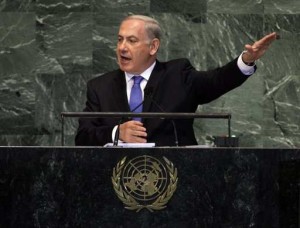October 11-13
Israeli Prime Minister Binyamin Netanyahu unleashed a very personal attack on President Rohani at the UN General Assembly last week, calling him a “wolf in sheep’s clothing.”

Netanyahu also laid out clearly what he wants the international community to impose on Iran—and that is a complete dismantling of its enrichment program.
But before his screed against Rohani, Netanyahu recalled better moments in Iranian-Jewish history, in an apparent effort to make clear that he stands opposed to the Islamic Republic and not to Iranians.
“The future is challenged by a nuclear-armed Iran that seeks our destruction,” he said. “But I want you to know, that wasn’t always the case. Some 2,500 years ago the great Persian King Cyrus ended the Babylonian exile of the Jewish people. He issued a famous edict in which he proclaimed the right of the Jews to return to the land of Israel and rebuild the Jewish temple in Jerusalem. That’s a Persian decree. And thus began an historic friendship between the Jews and the Persians that lasted until modern times.
“But, in 1979, a radical regime in Tehran tried to stamp out that friendship. As it was busy crushing the Iranian people’s hope for democracy, it always led wild chants of ‘Death of the Jews’.”
Actually, the chants in the Islamic Republic have always been “Marg bar Israel (Death to Israel) and have never called for killing Jews
Netanyahu’s speech was dominated by Iran. Of its 62 paragraphs, 48 or 77 percent dealt with Iran. He used the word “Rohani” 23 times.
A large part of the speech was a screed against Rohani, apparently intended to blunt Rohani’s “charm” campaign at the UN. Netanyahu said Rohani was “a loyal servant of the regime…. The regime that he represents executes political dissidents by the hundreds and jails them by the thousands.” He went through a litany of offenses by the government of the Islamic Republic over the years, linking Rohani to all of them and concluded that Rohani is “a wolf in sheep’s clothing.”
Netanyahu said, “I wish I could believe Rohani, but I don’t because facts are stubborn things, and the facts are that Iran’s savage record flatly contradicts Rohani’s soothing rhetoric.”
He said Rohani’s goal is to get sanctions lifted without giving “Iran’s nuclear weapons program in return.”
Netanyahu said: “Rohani thinks he can have his yellowcake and eat it too.”
Netanyahu then abandoned the colorful rhetoric and outlined his four-point proposal for Iranian action that would bring the end of sanctions.
“To be meaningful, a diplomatic solution would require Iran to do four things. First, cease all uranium enrichment. This is called for by several Security Council resolutions. [Actually they call for enrichment to be “suspended.”] Second, remove from Iran’s territory the stockpiles of enriched uranium. Third, dismantle the infrastructure for nuclear breakout capability, including the underground facility at Qom [Fordo] and the advanced centrifuges in Natanz. And, four, stop all work at the heavy water reactor in Arak aimed at the production of plutonium. These steps would put an end to Iran’s nuclear weapons program and eliminate its breakout capability,” Netanyahu said.
The prime minister attacked the talk of allowing Iran to enrich uranium to a limited degree, like 3.5 percent for power reactors, but not the 90 percent for weapons.
“There are those who would readily agree to leave Iran with a residual capability to enrich uranium,” Netanyahu said. “I advise them to pay close attention to what Rohani said in his speech to Iran’s Supreme Cultural Revolutionary Council. This was published in 2005. I quote. This is what he said:
“‘A country that could enrich uranium to about 3.5 percent will also have the capability to enrich it to about 90 percent. Having fuel cycle capability virtually means that a country that possesses this capability is able to produce nuclear weapons.’
“Precisely. This is why Iran’s nuclear weapons program must be fully and verifiably dismantled. And this is why the pressure on Iran must continue,” Netanyahu said.
He then outlined three points that he argued the international community must adopt as policy.
“First, keep up the sanctions. If Iran advances its nuclear weapons program during negotiations, strengthen the sanctions.
“Second, don’t agree to a partial deal. A partial deal would lift international sanctions that have taken years to put in place in exchange for cosmetic concessions that will take only weeks for Iran to reverse.
“Third, lift the sanctions only when Iran fully dismantles its nuclear weapons program. My friends, the international community has Iran on the ropes. If you want to knock out Iran’s nuclear weapons program peacefully, don’t let up the pressure. Keep it up.”
He concluded: “Three decades ago, President Ronald Reagan famously advised, ‘trust but verify.’ When it comes to Iran’s nuclear weapons program, here’s my advice: Distrust, dismantle and verify….
“Israel will not allow Iran to get nuclear weapons. If Israel is forced to stand alone, Israel will stand alone,” he pledged, renewing his ultimate threat.
The response in Tehran was a wall of officials all saying that Israel is incapable of attacking Iran—an odd comment given that the Islamic Republic constantly denounces Israel for possessing nuclear weapons.